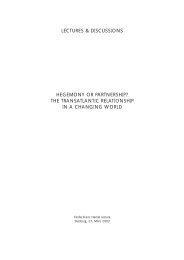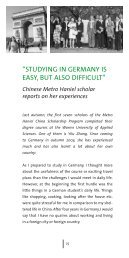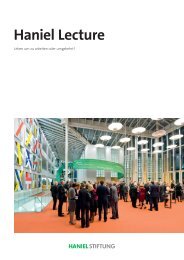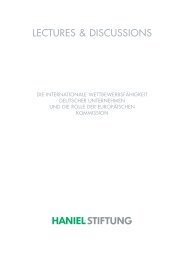Haniel Lecture 09 2010 E.pdf - Haniel Stiftung
Haniel Lecture 09 2010 E.pdf - Haniel Stiftung
Haniel Lecture 09 2010 E.pdf - Haniel Stiftung
You also want an ePaper? Increase the reach of your titles
YUMPU automatically turns print PDFs into web optimized ePapers that Google loves.
6<br />
Welcoming address<br />
Franz M. <strong>Haniel</strong><br />
Dear Ronald Heifetz, Mr Merz, ladies and gentlemen,<br />
In view of tonight’s topic, I should say that I am pleased that your worklife<br />
balance has allowed you to be here with us this evening. Those of<br />
you who have attended a <strong>Haniel</strong> <strong>Lecture</strong> before will be familiar with<br />
our aims. The <strong>Haniel</strong> <strong>Lecture</strong>s address issues and challenges brought<br />
about by social change and try to fi nd answers by approaching these<br />
issues from an entrepreneurial and political perspective, as well as<br />
from the European and North American perspective.<br />
The title of this year’s <strong>Haniel</strong> <strong>Lecture</strong> is “Live to work or work to live?”.<br />
The American poet Robert Frost once said, “By working faithfully<br />
eight hours a day, you may eventually get to be a boss and work<br />
twelve hours a day”. I would like to stress right from the outset that<br />
work and life should not be seen as two separate and irreconcilable<br />
worlds. Work is not the mandatory part of our existence and it is<br />
equally true that real life does not only take place outside of the<br />
workplace. It is up to you to decide for yourselves whether tonight<br />
for example is work, life or hopefully a bit of both for you.<br />
Ladies and gentlemen, it is the general consensus that, for some<br />
time now, the world of work has been caught in the midst of a fundamental<br />
process of change. The status quo of modern working<br />
society is characterised by many diff erent confl icts. Firstly, employment<br />
biographies have changed. Life-long service in one company is<br />
being replaced by multiple changes of employer, industry and place<br />
of work over the course of a person’s career. No form of education<br />
can guarantee life-long employment. Permanent jobs are giving way<br />
to temporary forms of employment. This development has been<br />
accompanied by life-long learning, the constant need to change our<br />
plans, the fear of not making progress in our jobs due to the brevity<br />
of the deployment period and the dissolution of borders between<br />
work and family life. In the future, no company will be able to aff ord<br />
to ignore the potential confl ict between work and family life.<br />
Secondly, work-life balance is so much more than just a modern<br />
term for equal opportunities for men and women in the workplace.<br />
There is more to it that laundry services and wellbeing. It is about<br />
a changing system of values that increasingly places emphasis on<br />
factors such as happiness and fulfi lment. It is about a fun da mental<br />
change in perspective, namely the recognition that employees’<br />
private lives should be taken into consideration to a greater extent<br />
in the interest of the company. And this should benefi t women<br />
primarily to make it easier for them to assume executive positions.<br />
Thirdly, the fi nancial and economic crisis that is now behind us has<br />
stepped up competition and hence put even more pressure on the<br />
ability of companies and leaders to change and adapt; and this<br />
trend is here to stay. We live in times of non-linear developments.<br />
Methods that used to be successful in the past may no longer be<br />
successful in the future. And this means that the pressure on individuals<br />
is greater than ever before.<br />
In his book, On the Shortness of Life, the Roman philosopher and<br />
politician Seneca says, “There is nothing the busy man is less busied<br />
with than living; there is nothing harder to learn”. The healthy<br />
identity of a person is based on achieving a certain harmony<br />
between work, relationship and family, body and health, social<br />
relationships, societal involvement and systems of meaning. Not<br />
all of these elements must be of equal importance in all stages of<br />
life, but over time a harmonious balance should be found between<br />
them. Companies need to support their employees not only to<br />
achieve good results in their jobs but also in their private lives.<br />
Ladies and gentlemen, if you follow these lines of thought then<br />
you will see that they throw up a number of new challenges, not<br />
only for the individual but also for companies and company management,<br />
socio-political conditions and thereby policymakers.











